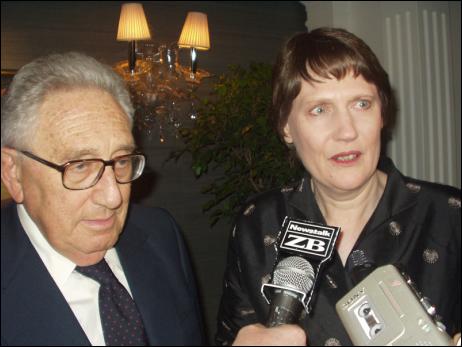Kissinger Meets Clark Over North Korea Nuke Crisis
By Selwyn Manning – in Seoul
Former United States Secretary of State Henry Kissinger met with New Zealand Prime Minister Helen Clark today in Seoul to discuss the North Korea nuclear crisis.

Former U.S. Secretary of State Henry Kissinger and New Zealand Prime Minister Helen Clark after talks today in Seoul. Image: Scoop Media
Kissinger is in South Korea officially representing the United States of America at the 50th Anniversary Armistice commemorations.
On exiting the Hyatt Hotel meeting in Seoul, Kissinger stressed talks with North Korea must be advanced. He said however the United States intends to play a major role, alongside China, in encouraging North Korea to rethink its move to equip itself with nuclear weapons.
Kissinger however made it clear, the United States is determined to prevent China from becoming the diplomatic peace-maker.
Kissinger said today China’s role in resolving the North Korea nuclear crisis was important but added: ‘we shouldn't present it as if China was being involved in this to do a favour to other countries.”
"The challenge is to find a method and approach in which China's interests are as involved as ours," Kissinger said.
China has in recent weeks been actively brokering a meeting between it and North Korea in Beijing. That meeting looks likely within weeks. Yesterday, New Zealand Prime Minister Helen Clark said it is important that China take a lead in bringing about peaceful dialogue.
Did Clark pass on a message to Kissinger [the Bush Administration’s close ‘friend’] on behalf of South Korea, and China?
Perhaps. Clark has quickly positioned herself as an intermediary in the North Korea/South Korea/USA stand-off.
Last week Clark met in New Zealand with the seventh ranked member of the Chinese Government, Mr Li Chang Chun. Friday she met with South Korea President Roh Moo-hyun. Saturday, she had a 45 minute ‘unofficial’ meeting with Henry Kissinger in Seoul. And as Kissinger said today, he has a close friendship with the Bush Administration. The series of meetings stacks up like a diary entry for a future UN secretary general.
Considering the intensity of aggression between the U.S. and North Korea, it appears few here in Seoul would see merit in a U.S-North Korea bilateral. Indeed, it is seen as a high-risk move that would likely further polarise the two governments. South Korea too appears to realise the consequences are potentially too grave to risk this, and perhaps, along with China, has aided Clark to alert the USA, via Kissinger, to allow China to bring North Korea to the peace table.
Certainly, there is urgency for peaceful and progressive dialogue to begin.
Despite South Korea President Roh Moo Hyun being elected in November 2002, amid a large-scale protest movement against the American forces, 37,000 American troops remain here in Seoul. This incites the North Koreans to believe an invasion is logistically probable.
Today North Korea's army Chief of the General Staff Kim Yong Chun said: "The arrogant and outrageous moves of the U.S. imperialists to stifle the DPRK by force are being carried into extremes."
North Korea believes the United States will invade should it not present a forceful presence.
"North Korea will promptly beat back any precision strike, surgical operation-style strike and pre-emptive nuclear attack with the powerful war deterrent force," Kim said.
The comments are the latest in a series of aggressive exchanges between the White House and Pyongyang, the North Korean capital.
In recent weeks North Korea has moved more heavy artillery to the North/South Korean Demilitarised Zone – a line that is described as the world's most heavily armed border. Earlier this month the USA said it would not allow North Korea to develop nuclear weapons.
Sources in Seoul said yesterday that North Korea likely knows that should it launch a nuclear attack on South Korea or Japan, the United States would ‘incinerate it’.
However, North Korea is driving head-on into a staunch Cold War-Styled deterrent policy.
U.S. intelligence suggests North Korea possesses at least one nuclear bomb and has the capability of developing more within months. With this information shaping toward substantiation, China, the United States, South Korea, and Japan are keen to have dialogue with North Korea as soon as is possible.
North Korea however has remained firm in insisting that talks be solely bilateral between it and the USA. Clark implied yesterday that China was positioning to convince the North Koreans that this approach was not in any nation’s interest.
Tension on the Korean Peninsula has intensified since, in September 2002, U.S. President George W. Bush highlighted North Korea as a country within what he termed the “Axis Of Evil”.
The Bush Administration then detailed in its National Security Strategy document, specific scenarios where the U.S. would consider pre-emptive military attack against nations it considers within this Axis of Evil.
North Korea retaliated aggressively, intent to equip itself with nuclear weapons and demonstrate means of striking nearby neighbours Japan and South Korea with medium range warhead carrying missiles should the U.S. threat be actioned. The North Korean government appears to calculate that the United States is more likely to invade those ‘Axis’ countries that are not nuclear armed, as it did in Iraq in March, than those that show a willingness to use nuclear weapons should an invasion or strike be imminent.


 Richard S. Ehrlich: Deadly Border Feud Between Thailand & Cambodia
Richard S. Ehrlich: Deadly Border Feud Between Thailand & Cambodia Gordon Campbell: On Free Speech And Anti-Semitism
Gordon Campbell: On Free Speech And Anti-Semitism Ian Powell: The Disgrace Of The Hospice Care Funding Scandal
Ian Powell: The Disgrace Of The Hospice Care Funding Scandal Binoy Kampmark: Catching Israel Out - Gaza And The Madleen “Selfie” Protest
Binoy Kampmark: Catching Israel Out - Gaza And The Madleen “Selfie” Protest Ramzy Baroud: Gaza's 'Humanitarian' Façade - A Deceptive Ploy Unravels
Ramzy Baroud: Gaza's 'Humanitarian' Façade - A Deceptive Ploy Unravels Keith Rankin: Remembering New Zealand's Missing Tragedy
Keith Rankin: Remembering New Zealand's Missing Tragedy